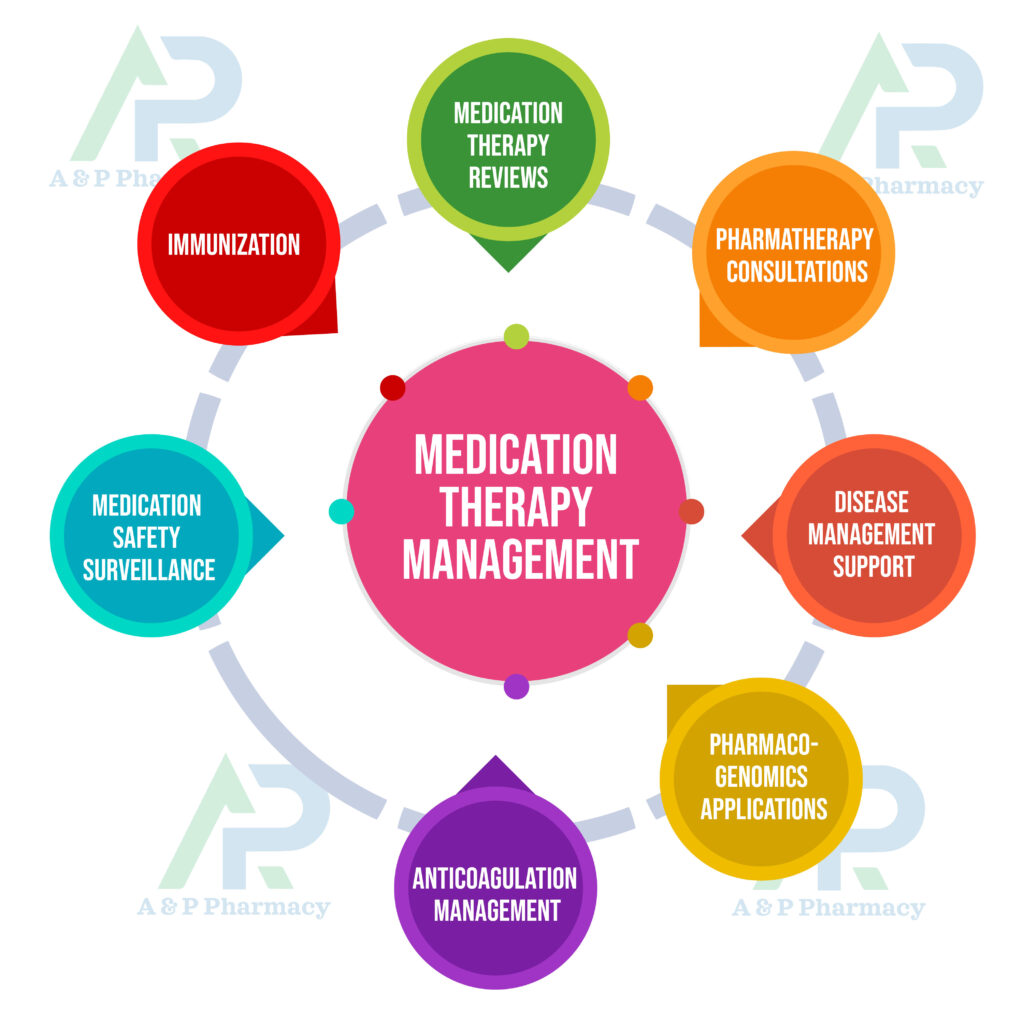Medication Therapy Management (MTM)
WHAT IS MEDICATION THERAPY MANAGEMENT?
Medication therapy management, otherwise known as MTM, is a term used for a program to help you manage your medications and health conditions.
- Do you take several medications for several different health conditions?
- Are you finding it difficult to manage your health and your medications?
- Are you having any side effects from your medications?
- Do you have any questions about your medications?
- Do you want to know how best to take your medications to get the most from your medications?
- Do you take medications that require close monitoring such as medication levels?
- Have you been hospitalized recently?
- Would you like to know if you are up-to-date on the recommended vaccines?
- Would you like to have a complete list of the medications you take for your personal use?
- Do you have any concerns about medication costs?
- Would you like to receive education on diet and exercise?

MTM service model in A&P Pharmacy practice includes
the following FIVE CORE Elements:
- Medication therapy review (MTR)
- Personal medication record (PMR)
- Medication-related action plan (MAP)
- Intervention and/or referral
- Documentation and follow-up
Every core element is integral to the provision of MTM; however, the sequence and delivery of the core elements may be modified to meet an individual patient’s needs. Pharmacists provide medication therapy management to help patients get the best benefits from their medications by actively managing drug therapy and by identifying, preventing and resolving medication-related problems.

WHO BENEFITS FROM MTM?
- Patient has experienced a transition of care, and his or her regimen has changed
- Patient is receiving care from more than one prescriber
- Patient is taking one or more chronic medications (including prescription and nonprescription medications, herbal products, and other dietary supplements)
- Patient has at least one chronic disease or chronic health condition (e.g., heart failure, diabetes, hypertension, hyperlipidemia, asthma, osteoporosis, depression, osteoarthritis, chronic obstructive pulmonary disease)
- Patient has laboratory values outside the normal range that could be caused by or may be improved with medication therapy
- Patient has demonstrated nonadherence (including underuse and overuse) to a medication regimen
- Patient has recently experienced an adverse event (medication or non–medication-related) while receiving care
- Patient is taking high-risk medication(s), (e.g., warfarin, phenytoin, methotrexate)
These services include but are not limited to the following, according to the individual needs of the patient:
- Performing or obtaining necessary assessments of the patient’s health status
- Formulating a medication treatment plan
- Selecting, initiating, modifying, or administering medication therapy
- Monitoring and evaluating the patient’s response to therapy, including safety and effectiveness
- Performing a comprehensive medication review to identify, resolve, and prevent medication-related problems, including adverse drug events
- Documenting the care delivered and communicating essential information to the patient’s other primary care providers
- Providing verbal education and training designed to enhance patient understanding and appropriate use of his/her medications.
- Providing information, support services, and resources designed to enhance patient adherence with his/her therapeutic regimens.
- Coordinating and integrating MTM services within the broader health care management services being provided to the patient.
